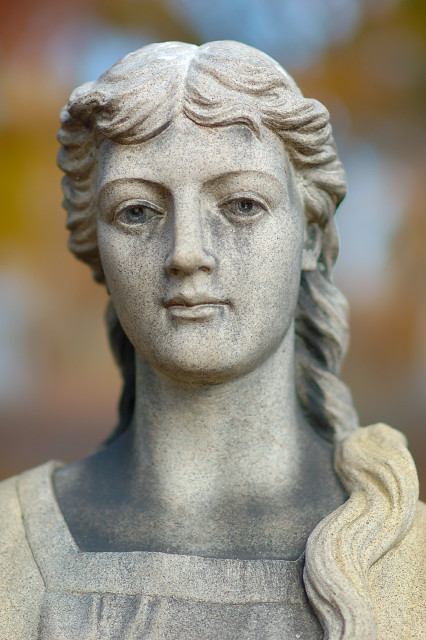
A detail of a statue, from the grave of Maysie Walker Pittman, at Calvary Cemetery in Saint Louis. Photo taken on this All Souls Day, November 2nd. More than a century old, the statue has some residual coal dust on it from the early 20th century as well as weathering. It is a touching memorial of a woman who died young.

She was born on August 10th, 1867 in Saint Louis County, with the given name Rose Marion Walker, and died on March 28th, 1896, at the age of 28. Her husband, Asa Pittman, died in 1899 at the age of 33. Her monument has Our Lord’s beatitude “Blessed are the pure in heart, for they shall see God,” which is from the Gospel reading for All Saints Day, November 1st, (Matt. 5:8).
A fine statue, but no one living knew this young woman. She has a fine monument, but very many of the departed do not; some cemeteries hereabout are even unmarked: we may pass by the remains of the departed in ignorance. As November is the month of the poor souls, we are reminded that we need to pray for them, and so instead, we can offer up a prayer for her, and for others known and unknown to us. As Saint Paul tells us, we are to “pray without ceasing” and so it is hardly an inconvenience.
From a homily of Saint John Chrysostom (ca. 347-407):
“But I know not whither he has gone,” say you. Wherefore do you not know, tell me? For according as he lived well or otherwise, it is evident whither he will go. “Nay, on this very account I lament,” say you, “because he departed being a sinner.” This is a mere pretext and excuse. For if this were the reason of your mourning for the departed, you ought to have formed and corrected him, when he was alive. The fact is thou dost every where look to what concerns yourself, not him.— Homily 41 on 1 Corinthians
But grant that he departed with sin upon him, even on this account one ought to rejoice, that he was stopped short in his sins and added not to his iniquity; and help him as far as possible, not by tears, but by prayers and supplications and alms and offerings. For not unmeaningly have these things been devised, nor do we in vain make mention of the departed in the course of the divine mysteries, and approach God in their behalf, beseeching the Lamb Who is before us, Who takes away the sin of the world—not in vain, but that some refreshment may thereby ensue to them. Not in vain does he that stands by the altar cry out when the tremendous mysteries are celebrated, “For all that have fallen asleep in Christ, and for those who perform commemorations in their behalf.” For if there were no commemorations for them, these things would not have been spoken: since our service is not a mere stage show, God forbid! Yea, it is by the ordinance of the Spirit that these things are done.
Let us then give them aid and perform commemoration for them. For if the children of Job were purged by the sacrifice of their father, why do you doubt that when we too offer for the departed, some consolation arises to them? Since God is wont to grant the petitions of those who ask for others.


Nice post, thanks.
ReplyDeleteit looks like she is crying
ReplyDelete